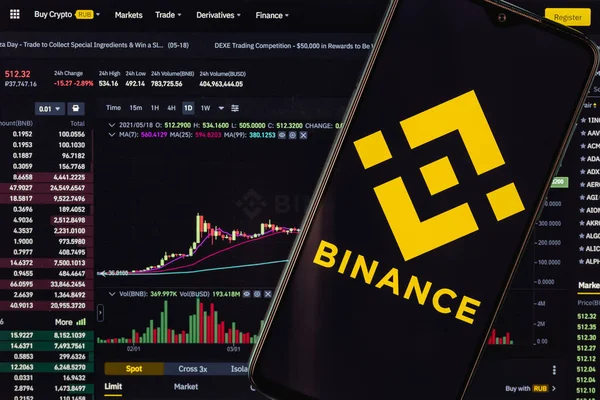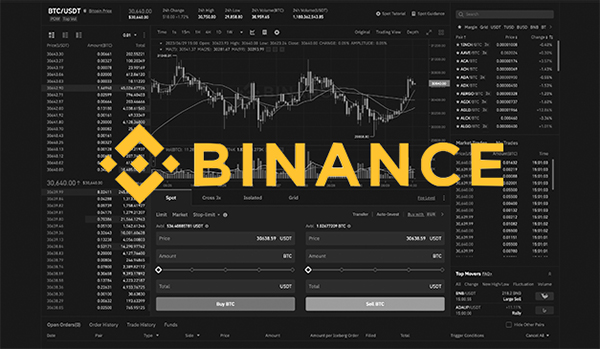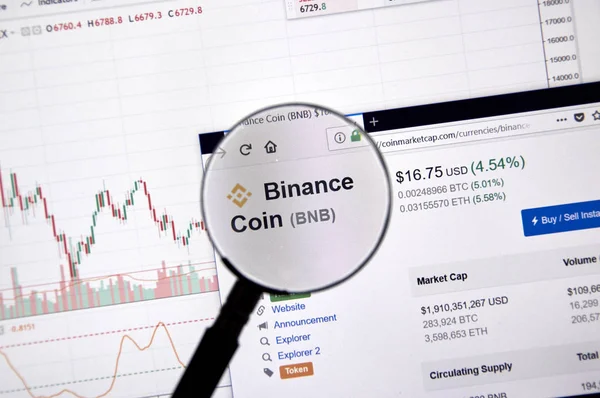Understanding Binance: A Global Cryptocurrency Exchange

Binance is one of the world’s largest cryptocurrency exchanges, founded in 2017 by Changpeng Zhao. It has quickly gained popularity due to its wide range of available cryptocurrencies, competitive trading fees, and advanced trading features. With millions of users globally, Binance has established itself as a go-to platform for both novice and experienced traders.
The exchange offers various services, including spot trading, futures trading, margin trading, and staking. Users can access a plethora of digital assets, including Bitcoin (BTC), Ethereum (ETH), and numerous altcoins. Additionally, Binance has launched its native token, BNB, which users can utilize to reduce trading fees and participate in exclusive events.
One of the key aspects of Binance is its commitment to innovation. The platform frequently updates its features and integrates new technologies, such as decentralized finance (DeFi) solutions and non-fungible tokens (NFTs). This adaptability has allowed Binance to remain at the forefront of the ever-evolving cryptocurrency landscape.
However, the global expansion of Binance has not come without challenges. Regulatory scrutiny has increased in many jurisdictions, particularly in the United States. This has raised questions about the exchange’s operational model in different regions, especially where regulatory compliance is a concern.
Despite these challenges, Binance has continued to grow and adapt its services to meet user demands and regulatory frameworks. Understanding how Binance operates within the U.S. market requires an examination of both the regulatory landscape and the exchange’s efforts to comply with U.S. laws.
Ultimately, Binance’s global reach and extensive service offerings make it a significant player in the cryptocurrency exchange market. Nevertheless, U.S. users must navigate specific regulations that may impact their experience on the platform.
Regulatory Landscape for Cryptocurrency in the USA

The regulatory environment for cryptocurrency in the United States is complex and constantly evolving. Various federal and state agencies oversee cryptocurrency activities, including the Securities and Exchange Commission (SEC), the Commodity Futures Trading Commission (CFTC), and the Financial Crimes Enforcement Network (FinCEN). Each agency has different criteria for determining the legality and regulation of cryptocurrencies.
The SEC, for instance, has focused its efforts on ensuring compliance with securities laws, often classifying certain cryptocurrencies and tokens as securities. This classification means that companies issuing these tokens must adhere to strict reporting and registration requirements. As a result, many cryptocurrency exchanges have been forced to adapt their operations to avoid legal repercussions.
The CFTC, on the other hand, regulates derivatives and futures trading, providing guidance on how cryptocurrencies can be classified within that context. This dual oversight creates a challenging landscape for exchanges operating in the U.S., as they must comply with both agencies’ regulations.
Additionally, individual states have their own regulatory frameworks, adding another layer of complexity. Some states, like New York, require companies to obtain a BitLicense, while others have little to no regulation. This patchwork of regulations means that exchanges must carefully navigate local laws to remain operational across the country.
Given this environment, it’s essential for cryptocurrency exchanges to prioritize compliance. In recent years, there have been numerous high-profile enforcement actions against exchanges that failed to meet regulatory requirements, resulting in significant financial penalties and operational restrictions.
As the regulatory landscape continues to evolve, it is crucial for users to stay informed about changes that could affect their trading experience and the availability of services on platforms like Binance.
Binance’s Compliance Efforts with US Regulations

In response to the regulatory challenges in the United States, Binance has made significant efforts to align its operations with U.S. laws. This includes launching a separate platform, Binance.US, specifically designed to comply with local regulations while providing access to a limited selection of cryptocurrencies.
Binance.US operates under the guidance of the Financial Crimes Enforcement Network (FinCEN) and adheres to Anti-Money Laundering (AML) and Know Your Customer (KYC) regulations. Users are required to verify their identity through a series of checks before being granted access to the platform. This approach aims to enhance security and ensure compliance with federal laws.
Moreover, Binance has been transparent about its commitment to regulatory compliance. The company has actively engaged with regulators and industry groups to foster dialogue and understanding of the cryptocurrency market. This proactive approach demonstrates Binance’s willingness to adapt and comply with regulatory expectations.
In addition to creating Binance.US, the exchange has implemented robust security measures to protect users and prevent illicit activities. These measures include advanced cybersecurity protocols, regular audits, and ongoing monitoring of transactions to detect suspicious behavior.
Furthermore, Binance has sought to cultivate relationships with regulatory bodies by providing education and resources related to cryptocurrency trading. By doing so, the exchange aims to bridge the gap between regulators and the rapidly evolving crypto ecosystem.
Overall, Binance’s compliance efforts reflect its recognition of the importance of operating within legal frameworks. As regulations continue to evolve, the exchange’s adaptability will be critical in maintaining its presence in the U.S. market.
Available Features of Binance for American Users

For American users, Binance.US offers a limited but robust selection of features tailored to comply with U.S. regulations. While it may not offer the full range of cryptocurrencies available on its international counterpart, Binance.US still provides access to several popular digital assets, including BTC, ETH, and various altcoins.
The exchange supports multiple trading options, including spot trading, which allows users to buy and sell cryptocurrencies at current market prices. Moreover, users can engage in advanced trading through limit orders and stop orders, enhancing their ability to manage trades effectively and mitigate risks.
Binance.US also incorporates a user-friendly interface, making it accessible for both beginner and experienced traders. The platform provides educational resources, such as tutorials and articles, to help users navigate the complexities of cryptocurrency trading.
Another notable feature is the staking option available on Binance.US. This allows users to earn rewards by holding and “staking” certain cryptocurrencies. Staking has gained popularity as a way to generate passive income while supporting the underlying blockchain networks.
Security remains a top priority for Binance.US, as it employs state-of-the-art measures to safeguard user funds and personal information. Two-factor authentication (2FA), withdrawal address whitelisting, and cold storage solutions are just a few of the robust security features provided.
While Binance.US may not offer every service available on the global Binance platform, it still caters to the needs of American users through its focused offerings and commitment to compliance, making it a viable option for cryptocurrency trading.
Alternatives to Binance for US Cryptocurrency Traders

As U.S. regulatory scrutiny intensifies, cryptocurrency traders are increasingly seeking alternatives to Binance for their trading needs. Several other exchanges cater to American users, offering similar features and services.
- Coinbase: Known for its user-friendly interface, Coinbase is one of the most popular exchanges in the U.S. It provides a wide range of cryptocurrencies and includes features such as educational resources and staking opportunities. Coinbase also offers a separate trading platform called Coinbase Pro, which caters to more experienced traders.
- Kraken: Another well-established exchange, Kraken is known for its strong security measures and extensive selection of cryptocurrencies. It offers features such as margin trading, futures trading, and a user-friendly API for algorithmic trading, appealing to both novices and advanced traders alike.
- Gemini: Founded by the Winklevoss twins, Gemini is a regulated cryptocurrency exchange that emphasizes security and compliance. The platform offers a user-friendly interface, as well as a mobile app for trading on the go. Gemini also provides a unique feature called Earn, allowing users to earn interest on their crypto holdings.
| Feature | Binance.US | Coinbase | Kraken | Gemini |
|---|---|---|---|---|
| User-friendly | Yes | Yes | Yes | Yes |
| Staking | Yes | Yes | Limited | Yes |
| Margin Trading | No | No | Yes | Yes |
| Security | High | High | Very High | Very High |
These alternatives provide U.S. users with diverse options for trading cryptocurrencies. However, each platform has its own strengths and weaknesses, making it essential for traders to assess their individual needs and preferences.
Ultimately, the choice of exchange will depend on factors such as security, available features, and user experience. As the cryptocurrency market continues to mature, traders should remain informed about the evolving landscape and the options available to them.
Future Prospects for Binance in the United States

Looking ahead, the future prospects for Binance in the United States remain uncertain but promising. The exchange has demonstrated its adaptability and commitment to compliance through the establishment of Binance.US and its proactive engagement with regulators.
However, the changing regulatory landscape poses ongoing challenges that may influence Binance’s operations. As U.S. regulators continue to refine their policies and enforcement strategies, it is critical for Binance to stay ahead of developments to maintain its presence in the market.
Moreover, the competitive landscape is becoming increasingly crowded, with many exchanges vying for market share. Binance must continue to innovate its offerings to attract and retain users, particularly in areas such as security, trading features, and customer service.
In addition, the growing interest in cryptocurrencies among retail and institutional investors could present opportunities for Binance to expand its user base. As more individuals and businesses recognize the value of digital assets, exchanges that provide compliant and user-friendly platforms are likely to thrive.
Overall, while challenges remain, Binance’s global experience, technological advancements, and compliance strategies position it well to navigate the complexities of the U.S. market. The exchange’s ability to adapt and innovate will be key to its success in the years to come.
In conclusion, Binance’s future in the United States largely hinges on regulatory developments, competitive dynamics, and its ongoing commitment to providing a reliable trading platform for American users. As the cryptocurrency landscape evolves, it will be essential for Binance to maintain its focus on compliance and customer satisfaction.











Nice breakdown of alternatives to Binance for U.S. traders. I might check out Kraken and Gemini too.
I didn’t know there were so many regulatory bodies in the U.S. overseeing cryptocurrencies!
“Binance’s Compliance Efforts” shows their commitment, but will it be enough with changing regulations?
It’s good to know that Binance has many features, but it’s also important they focus on security and compliance.
I learned a lot about how Binance operates globally. It’s interesting to see how they handle regulations in the U.S.
The article explains well how Binance is trying to comply with U.S. laws by creating Binance.US.
“Understanding Binance” made it clear why it’s one of the biggest exchanges, despite all those regulations.
The section on the regulatory landscape was helpful for understanding why crypto exchanges face challenges in the U.S.